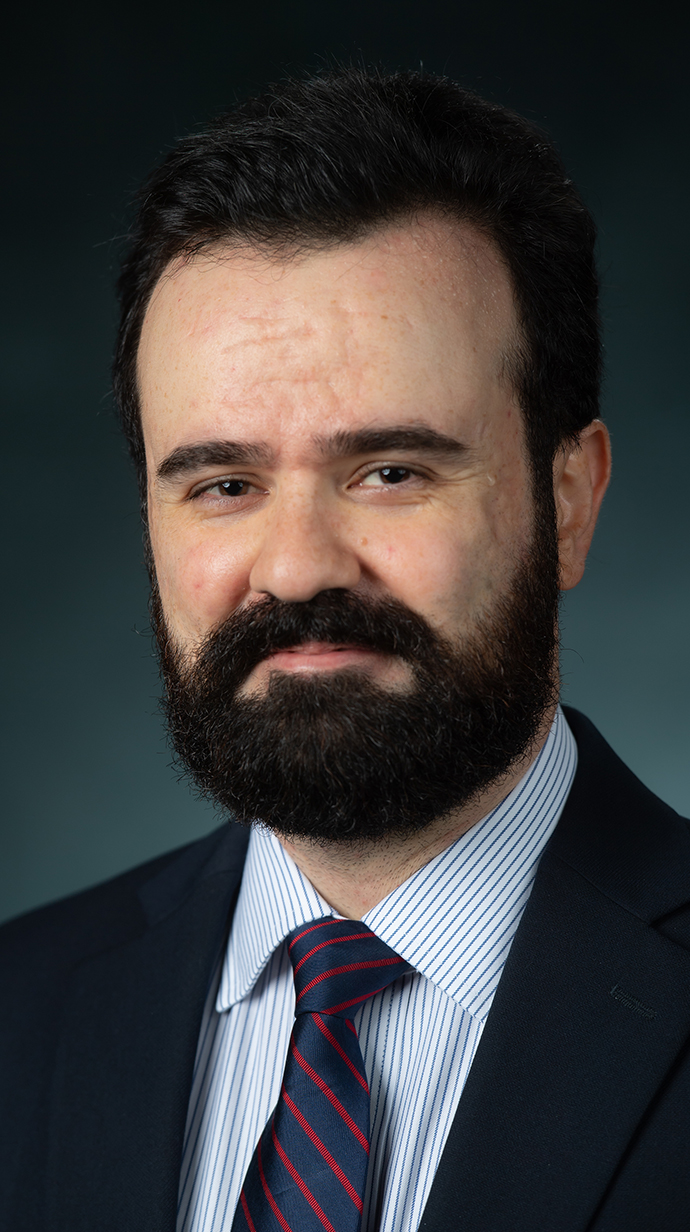Professor Studying Innovative Intersection Designs
Amir Molan evaluating safety performance, updating designs of restricted crossing U-turn intersections
OXFORD, Miss. – A University of Mississippi civil engineering professor is hoping to improve traffic safety through recent studies into an innovative intersection design known as restricted crossing U-turn, or RCUTs.
The Mississippi Department of Transportation awarded Amir Mehrara Molan, UM assistant professor of civil engineering, with $239,900 to study RCUTs. Additionally, the North Carolina Department of Transportation awarded Molan and his research partners a two-year, $208,555 grant to study the safety of access points at either end of a U-turn crossover.
RCUTs are an intersection design that aim to reduce crashes by limiting left turns. Drivers exiting a side street who want to take a left turn will take a right at the intersection and make a U-turn further down the main road.
The use of innovative intersection designs, such as RCUTs, have been touted by the Federal Highway Administration and listed in their Safe System Approach.
"RCUT intersections can reduce the number of fatal and injury crashes at an intersection as well as the injury severity of all crashes," Molan said. "More than a dozen RCUT intersections have been implemented in Mississippi since 2012, with many more in the construction and planning phases."

The MDOT project has two objectives, Molan said. The first is to conduct before-and-after safety evaluations that will measure how much RCUTs have improved traffic safety. The second is to update the current state's design best practices for RCUTs, which were initially developed in 2010.
To achieve these goals, Molan and his research team will review past studies, use advanced safety models to analyze historical crash data and conduct focus groups with several state Department of Transportation experts. The results could help MDOT in future intersection improvement projects and the implementation of new RCUTs.
For the study in North Carolina, Molan is collaborating with the University of North Carolina Highway Safety Research Center. "Past studies from other states – mostly from North Carolina – showed significant safety improvements by replacing old intersections with RCUTs," Molan said. "We are evaluating the safety performance of RCUTs when there are access points – side streets – near U-turn crossovers, compared to RCUTs with no access points."
Graduate students Gaurav Aryal, of Nepal, and Troy Hill, of Tallahatchie County, are researching RCUTs as for their master's theses. Aryal is focusing on the safety aspects of RCUT intersections, and Hill is working on design considerations.
Doctoral student Stephen Osafo-Gyamfi, of Ghana, and two undergraduate students, William Webster and Jaren Griste, are also assisting the research team.
"The research projects provide ample learning opportunities for graduate students that will benefit them throughout their life," said Srinivas Pulugurtha, professor and chair of civil engineering at Ole Miss. "They range from understanding the role of unconventional designs and their implications on traffic operational performance and safety to challenges associated with data to assess the designs and application of advanced analytical methods.
"Overall, the experience working on the research projects and their interactions with experts and practitioners in the field will hone their problem-solving interdisciplinary skillsets and ability to make informed decisions."
Top: This RCUT is at the intersection of U.S. Highway 98 and Old Highway 63 North near Lucedale in George County. The intersection is designed to keep traffic flowing while reducing the number of crashes. Submitted photo
By
Staff Report
Campus
Office, Department or Center
Published
October 04, 2024
